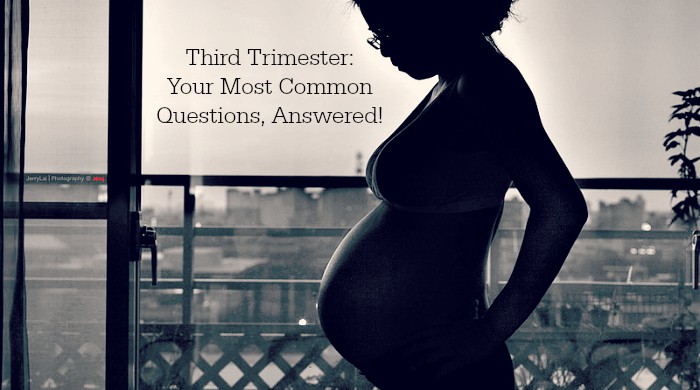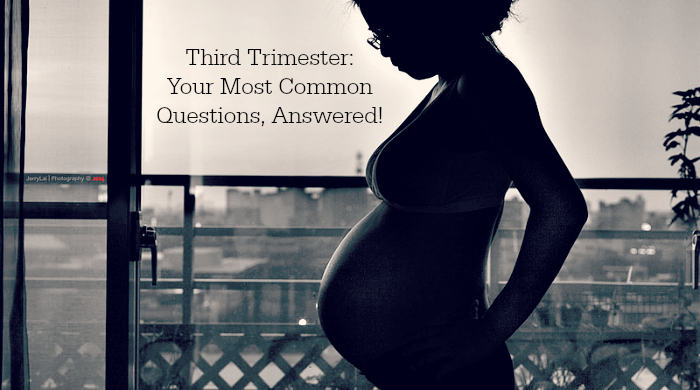 You’ve reached third trimester, 28 weeks and all of a sudden your pregnancy seems to be flying by and you’re frantically preparing for your new baby’s arrival. Your prenatal check ups have been scheduled every two weeks and you’re in the home stretch. Now is the time to start preparing your list of questions for your doctor or midwife and start asking at those bi-monthly (soon to be weekly) appointments.
You’ve reached third trimester, 28 weeks and all of a sudden your pregnancy seems to be flying by and you’re frantically preparing for your new baby’s arrival. Your prenatal check ups have been scheduled every two weeks and you’re in the home stretch. Now is the time to start preparing your list of questions for your doctor or midwife and start asking at those bi-monthly (soon to be weekly) appointments.
1. What types of tests will I have during the third trimester?
- Gestational Diabetes screening
- Repeat Hemocrit
- Repeat testing for STD’s in high risk populations although this may be routine with your provider
- Group B Streptococcus
- If needed a fetal ultrasound
- If needed Rh Antibody Screen and RhoGAM if Rh-Negative
2. When will I receive cervical checks?
Accoding to Healthline, each patient and pregnancy is different, however in the last month of your pregnancy your provider will check for cervical effacement, position and dilation.
3. How will I know if baby is head down?
During the second half of the third trimester, Healthline says your provider will check for the baby’s position (externally) performing Leopold’s maneuvers. It’s important to note if baby is breech, transverse or head down.
4. What do I need to pack in my hospital bag?
There are lists all over the Internet outlining what to pack for your hospital stay. There are lists for labor, post delivery, c-sections, dads, and baby. From experience, less is more. I over packed both times and remember your partner can always bring what was forgotten.
Check out these helpful lists/suggestions:
Baby Center’s comprehensive list includes so much I didn’t think of
Fit Pregnancy outlines their 10 Essentials to rbng
American Pregnancy offers their own ‘essentials’ Checklist
5. What about car seats and car safety?
Someone will be driving you and your baby home, so it’s important you have the proper gear for the car. You’ll need a safe car seat to transport baby. Depending on your budget there are ample of options when choosing a car seat. Once you have the best seat for your needs/vehicle make sure to get it safety checked. All fire departments will do this for free and many county offices have this option available as well. Check your local government websites to see where this can be done at no extra charge.
6. Amniotic Fluid or Urine?
You’re not sure if you’ve had an unfortunate accident or your amniotic fluid sac broke, well according to Mayo Clinic it’s best to contact your provider and note any changes in color or odor. Avoid doing things that will introduce bacteria into your body. From experience a stream of urine will stop, the broken amniotic sac will continue to leak.
7. Medicated birth or not?
By the third trimester, I’m sure you’ve had a lot of time to think about how you want to deliver your baby. The decision on how to birth your baby is between you, your partner and medical provider. Whatever you choose educate yourself and have a contingency plan. If you have any concerns about the safety of you or the baby make sure to discuss them with your provider to make the best educated decision about the birth of your baby.
8. Breast or bottle?
Again, the decision on how you feed your baby is your choice. However, if you choose to breastfeed here are some helpful books to check out.
Breastfeeding Made Simple: Seven Natural Laws for Nursing Mothers
Ina May’s Guide to Breastfeeding
The American Academy of Pediatrics New Mother’s Guide to Breastfeeding
The Breastfeeding Book: Everything You Need to Know About Nursing Your Child from Birth Through Weaning
Once in the hospital make sure you speak up so you can meet with a lactation consultant and get the help and support you need. If bottle feeding suits your needs research the type of formula and find a bottle that suits baby best.
Photo credit: adapted from JerryLai0208 | Flickr
